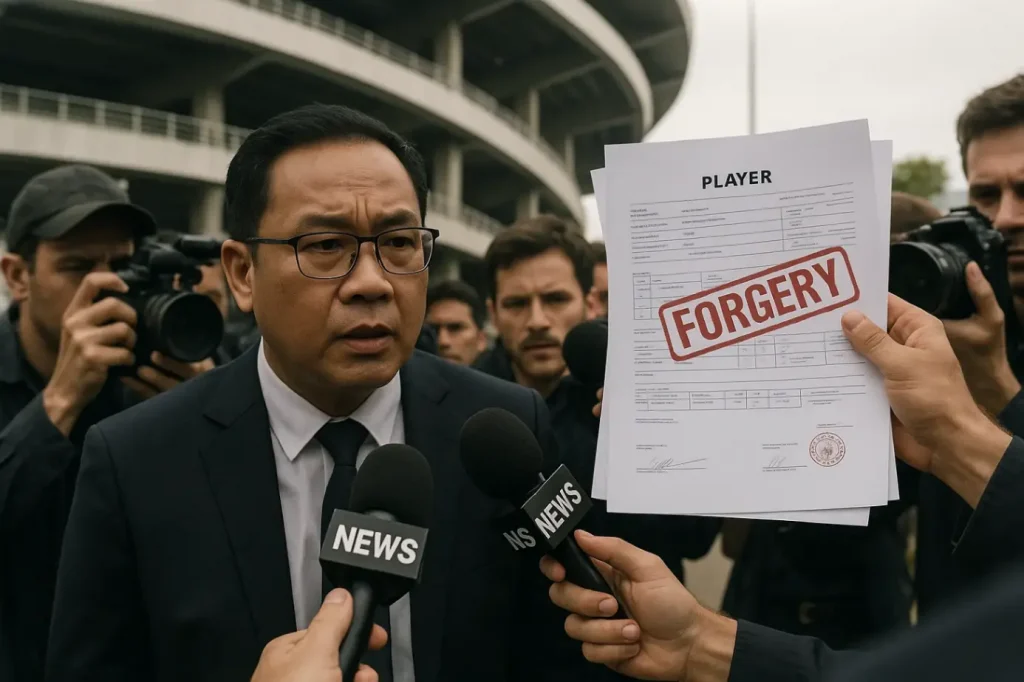Scandal 2025: Malaysia and the Football Document Forgery Controversy
508 views, 16.10.2025
In 2025, Malaysian football found itself at the epicenter of a scandal that shook the nation’s sporting credibility to its core. It was a dramatic collision of ambition, regulation, and deception—FIFA’s disciplinary arm concluded that the Football Association of Malaysia (FAM) had submitted forged documents to render ineligible foreign-born players apparently eligible to represent Malaysia. The revelation exposed glaring weaknesses in governance, verification procedures, and institutional integrity.
This article traces how the scandal unfolded, examines the actors and motivations, analyzes the consequences and institutional fallout, and explores the broader implications for Malaysian and global football.
Background: Malaysia’s “Heritage Player” Strategy and the Eligibility Gamble
Since around 2018, Malaysia has embraced a strategy of recruiting heritage or foreign-born players with alleged ancestral links, aiming to accelerate its national team’s competitiveness. Its FIFA ranking had dropped to an all-time low (178th) in 2018, prompting renewed efforts to revitalize the squad. Over the years, the Football Association of Malaysia (FAM) increasingly relied on fast-tracked naturalisations or eligibility claims based on lineage to supplement its domestic talent base.
By 2025, FAM’s approach had matured into a bold gamble. In early 2025, the Johor Crown Prince publicly stated that six to seven heritage players had been identified for inclusion in Malaysia’s team for the upcoming 2027 AFC Asian Cup qualifiers. Between March and June 2025, FAM submitted to FIFA “ancestral documents” (birth and death certificates of grandparents, purportedly born in Malaysian states) to validate the claims of seven foreign-born players. FIFA initially cleared the players, allowing them to represent Malaysia in international matches, including a notable 4–0 victory against Vietnam on 10 June 2025.
Yet, almost immediately after that match, doubts began to surface. A formal complaint reached FIFA’s Disciplinary Committee, challenging the authenticity of the documents that FAM had submitted. Behind the scenes, the seeds of the scandal had taken root.
The Investigation: Forensic Review, Evidence, and FIFA’s Ruling
When FIFA accepted the complaint, its Committee initiated an investigation grounded in Article 22 of the FIFA Disciplinary Code, which prohibits forgery, falsification, or misuse of official documents in matters of player eligibility.
FIFA’s investigative process included these steps:
Document comparison: FIFA obtained the original birth certificates for the players’ grandparents and compared them with the copies submitted by FAM. In each case, significant mismatches were evident.
Verification with Malaysian authorities: The National Registration Department (NRD) of Malaysia stated that it had never received the original certificates alleged to support the claims.
Lineage inconsistencies: FIFA discovered that the grandparents of the seven players were in fact born in foreign countries (Argentina, Brazil, Spain, Netherlands) rather than in Malaysian states named in the documents.
Timing and oddities: Some documents were dated or drafted suspiciously close to 2025, raising red flags about their authenticity.
After completing its investigation, FIFA’s Disciplinary Committee delivered a verdict in late September 2025, with a detailed 6,000-word ruling explaining how the discrepancies constituted a violation of eligibility rules.
Among the key findings:
The documents submitted by FAM were forged or altered expressly to misrepresent the ancestral origins of the players.
The act constituted a deliberate attempt to circumvent FIFA rules, not just a bureaucratic oversight.
Because these players had participated in matches, including scoring goals, the competitive integrity of those matches was compromised.
Consequently, FIFA determined the following sanctions:
| Entity / Person | Sanction Imposed |
|---|---|
| Football Association of Malaysia (FAM) | Fine of CHF 350,000 (approx. RM1.9 million) |
| Each of the 7 implicated players | Fine of CHF 2,000 + 12-month suspension from all football activities |
| Match result implications | Possibility of forfeiture (e.g. turning the 4–0 win into a 0–3 loss) |
FIFA clearly stated that forgery in the context of player eligibility is tantamount to cheating, undermining the foundations of fair play in international competition.
Key Actors, Motivations, and the Human Dimension
The Players and Their Claims
The scandal centers on seven foreign-born players who had been naturalised—or claimed naturalisation—on the basis of purported ancestral links to Malaysia. The players are:
- Gabriel Felipe Arrocha
- Facundo Tomás Garcés
- Rodrigo Julián Holgado
- Imanol Javier Machuca
- João Vítor Brandão Figueiredo
- Jon Irazábal Iraurgui
- Héctor Alejandro Hevel Serrano
These were not peripheral figureheads—they were central to Malaysia’s game plan. In the 4–0 match against Vietnam, for example, Holgado and Figueiredo scored goals that altered the contest’s flow. For Holgado, in particular, this has been a dramatic reversal: he had recently become a national team figure, but following the sanction he is now suspended.
While the players (and FAM) have denied any deliberate wrongdoing, many observers view their defense as implausible in light of the depth of FIFA’s forensic evidence.
The Role of FAM and National Authorities
FAM is at the heart of institutional accountability. It was responsible for collecting, verifying, and submitting player documents to FIFA. In its defense, FAM insisted that it acted in “good faith,” claiming earlier approvals from FIFA validated their approach. Malaysia’s Youth & Sports Ministry, led by Hannah Yeoh, later called on FAM to provide clear responses to the revelations, noting that fans were “hurt, angry, disappointed.”
Tunku Ismail Sultan Ibrahim (Crown Prince of Johor), who has personal investment in Malaysian football (he owns Johor Darul Ta’zim F.C.), publicly questioned why FIFA reversed its earlier approval. The Ministry of Home Affairs and the NRD were also drawn into the conversation regarding their oversight of citizenship and record registration.
Motivations, Risks, and Dilemmas
Why would FAM (or its agents) attempt such a risky maneuver? A few motivations stand out:
- Sporting pressure: Malaysia sought quick gains in international competition, hoping heritage players would deliver performance boosts that native reserves could not.
- Image and expectation: The government and football authorities may have felt compelled to show demonstrable progress in national team quality.
- Short-termism: Rather than long-term investment in grassroots development, some decision-makers may have treated eligibility shortcuts as acceptable trade-offs.
But the risks were profound: not only sanctions, but reputational damage, loss of trust from fans and sponsors, and governance collapse.
Consequences, Fallout, and Institutional Reckoning
Competitive and Sporting Consequences
Perhaps the most immediate question is whether Malaysia’s 4–0 win over Vietnam will stand. FIFA’s Tribunal is now reviewing whether that result must be overturned, potentially converting it into a 0–3 forfeit loss. The Asian Football Confederation (AFC) has deferred action until FIFA’s Football Tribunal gives its final judgment. Depending on the decision, group standings in the AFC Asian Cup qualifiers may shift, affecting Malaysia’s path forward.
Reputation, Trust, and Sponsorship
Malaysian football’s credibility has taken a serious blow. Rather than being celebrated for a strong win, the Haramiau Malaya squad is now associated with deceit. Sponsors and fans alike are reassessing their support. The scandal also opens conversation in Malaysia about fairness, rule of law, and the legitimacy of citizenship processes.
Institutional Reforms and Accountability
To restore trust, FAM and Malaysian sporting authorities must enact meaningful reform. Areas requiring urgent attention include:
- Independent verification of submitted documents, potentially third-party audits.
- Stricter due diligence protocols before approving heritage claims.
- Transparency and public reporting of eligibility decisions and verification steps.
- Internal accountability, with possible resignations or sanctions for officials who oversaw or authorized the submission of false paperwork.
If Malaysia fails to reform, it risks further disciplinary acts from regional bodies and continued skepticism about its football governance.
Legal, Political, and National Implications
There is speculation that Malaysia’s Anti-Corruption Commission (MACC) could open a criminal probe to see if forgery laws or corruption statutes were broken domestically. The political ramifications also extend to citizenship policies: critics note the paradox that genuine stateless or marginalized individuals in Malaysia are often denied citizenship, whereas high-profile athletes could seemingly gain it on suspicious grounds.
Additionally, the scandal forces all nations to confront a broader question: how to balance the use of heritage players with ethical, legal, and institutional safeguards.
Lessons Learned and the Road Ahead
The Malaysia document forgery scandal holds stark lessons for all football federations:
- Governance matters above all: A strong verification framework is non-negotiable when citizenship or lineage is used in eligibility.
- Shortcuts carry existential risk: Attempts to bypass rules can destroy years of reputational work overnight.
- Transparency and accountability restore trust: Stakeholders demand clarity, not denials.
- Long-term development beats quick fixes: Relying on naturalisation for instant performance is ultimately unsustainable.
In the end, Malaysia must confront the damage not just in fines or suspensions, but in institutional trust and moral legitimacy. The path back demands humility, structural reform, and a renewed commitment to integrity.
Conclusion
The 2025 Malaysia document forgery scandal is not just a story about seven players or one federation—it’s a wake-up call to football’s global ecosystem about governance, trust, and the fragility of legitimacy. A night that was meant to be a triumph became a cautionary tale when veracity dissolved under scrutiny. Though FAM and the players may appeal, the damage is more than financial: it is ethical and reputational. If Malaysian football is to recover, it must rebuild through accountability, reform, and consistency. Only then can the Harimau Malaya team hope to compete—and be respected—on true merit.





